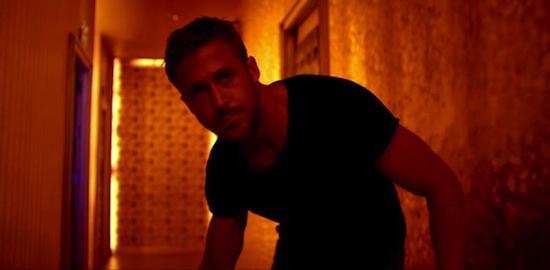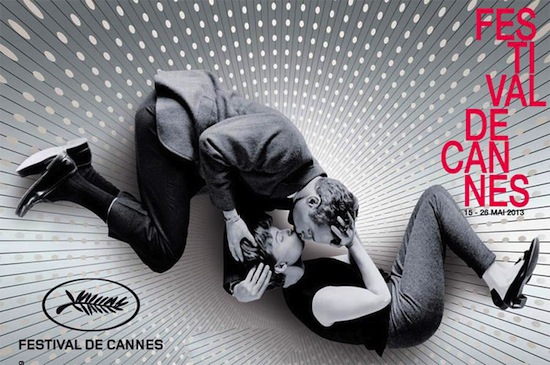Steven Spielberg Loves a Blue Movie
When Steven Spielberg was announced as 2013’s Jury Head, many critics griped that such a mainstream, populist filmmaker might be adrift in the left-field, gritty selections that Cannes tends to offer. Of course Spielberg has showed himself on numerous occasions to make more complex, troubled films than E.T. or the Indiana Jones series (A.I, Munich, even Minority Report and War of the Worlds minus the cop-out endings) but, hey, why let facts ruin a convenient Twitter trend.
Nevertheless, as soon as the credits rolled on Hirokazu Korreeda’s warm, wry, heartbreaking Like Father, Like Son – the tale of two six-year-old kids mistakenly swapped at birth, whose parents contemplate exchanging them back – I, like many others, was convinced: this would be Spielberg’s salvation. He could waylay the inevitable claims of nationalism that would come from selecting a US winner; and still choose a film that fundamentally reflected his humanist, sentimental worldview, one that interrogates, yet celebrates the messy business of family, from a filmmaker who rivals Spielberg himself in his expert direction of children.
Spielberg was hardly making solo decisions when doling out the prizes, but the Palme D’Or choice of Blue is the Warmest Colour, with its scorchingly intimate, passionate take on young love and lust, complete with three-hour running time and explicit sex, was the right one in every way. By far the film that aroused the most fervent support across the entire festival, it’s a triumph for its director Abdellatif Kechiche and especially for its daring lead actresses, Adèle Exarchopolous and Léa Seydoux.
That Spielberg and co clearly cited both Exarchopolous and Seydoux in addition to Kechiche showed recognition for everything the film attempts. It also tripled the number of female Palme D’Or winners (only previous woman to win: Jane Campion – who shared 1993’s top prize for The Piano). And, coming in the week of a French vote about same-sex marriage, no little statement of support – though they claimed politics played no part – for the progressive argument on marriage equality. Not a bad twelve days work for a director often thought to symbolize – and even to have initiated – the worst tendencies of infantilizing, homogenizing, colonizing American cinema.
Only Cannes Forgives Only God Forgives
Let’s face it, if you can’t provide an out-and-out consensual masterwork (as most considered Michael Haneke’s Amour to be last year), the next best – perhaps even the very best – thing is to provide a scandal (from Madonna’s 1991 cone-shaped bra to Lars Von Trier’s 2011 Nazism ramblings). In all honesty, Cannes 2013 failed to provide much of a genuine cause célèbre. Early on, a man’s genitals were set aflame in Heli (sadly not scored to Kings of Leon’s ‘Sex On Fire’); and Jia Zhangke pushed genre violence more than he’d ever done in A Touch of Sin. But other than that, nul. The real jewel thefts and minor shooting incident during a Christoph Waltz interview trumped anything onscreen.
So there was almost relief at the smattering of boos that followed the first screening of Nicholas Winding Refn’s Only God Forgives, his follow-up to / reteaming with star Ryan Gosling, following their 2011 award-winning Cannes success with Drive. Gratuitous, soporific, pretentious – yet somehow earnest and anguished – it’s the worst blend of grindhouse and arthouse and a blood-soaked V-sign to the Hollywood respectability offered Winding Refn following Drive’s acclaim. A beautiful travesty, then, and, nestled in beside po-faced auteurism and tacky showbiz, exactly what Cannes is all about.

Cherchez les femmes
It’s become a little predictable now, but the familiar cry of “where are the women directors?” has – justly – been ringing out for years. Yet again, only one woman – Valeria Bruni Tedeschi, sister of ex-First Lady Carla – had her film Un Chateau en Italie In Competition this year.
However, look to the left, to Un Certain Regard, effectively the Championship to the Competition’s Premier League, and of the eighteen films programmed, eight have female directors, one of them even the celebrated French director Claire Denis (though conspiracy buffs claimed Denis had been deliberately shunted off to the sidelines). Of course, it would be preferable to right the imbalance of male and female filmmakers in the highest profile selection; but the plethora of women in Un Certain Regard shows that they are far from being neglected. In addition, Britain’s own Clio Barnard, whose The Selfish Giant, showing in the Directors’ Fortnight sidebar, became one of the most acclaimed films of the entire festival.
More subjectively and, I imagine, controversially, of the films I saw in Un Certain Regard, none of those with a female director would I personally have selected for a Competition slot. Could it be that this year’s films directed by women simply weren’t good enough? And should that matter? Or should there simply be some kind of quota? We can and should debate the depressing, ongoing sexism that denies women the same opportunities to make films as men. But, presumably, sometimes it comes down to a judgment on the work itself. And this year I’d find it hard to argue for any additional female inclusion. Disappointingly too, the Bruni Tedeschi film received the most lukewarm reviews of all the Competition films; hardly a rallying call.
Let Them Eat (Yellow) Cake
Any press pass at Cannes is still a prized possession; just ask the dozens flocked outside the Palais de Festival, desperate for tickets. But Cannes does hierarchy and privilege like no other film festival. Press passes are graded by colour – white and pink for the big boys; blue for the middle men; and the dreaded yellow for Latvian websites, Bolivian radio stations and monthly style magazines. I’ve even seen one renowned Australian journalist with a black pass, which I believe entitles her to screen her own home movies in the Grand Theatre Lumiere and pinch Leonardo DiCaprio’s seat if she fancies it.
Pass colour isn’t an issue at the 8.30 am daily Competition screenings, which are first come, first served; get there 30-40 minutes early, you’re pretty much guaranteed a seat. The problems come everywhere else at the late morning, afternoon, evening and night shows, where elitism reigns. Blues and yellows can queue in line, sometimes outside in the pouring rain, for hours, only to see pinks and whites arriving at the last moment and sailing past them into a supposedly ‘Complet’ (Full) auditorium.
This year the 10 pm screening of the Coen Brothers Inside Llewyn Davis, possibly the festival’s hottest ticket as it hadn’t had an 8.30 am presentation, turned disastrous. Yellows who’d queued for and not made it into the 7.30 pm showing, had then gone straight into waiting for the later show, only to miss out again, despite effectively waiting for three and a half hours, vented their frustration. Given it was a bunch of light-deprived, out-of-shape film writers, the likelihood of a riot was low; but there was a stand-off of several minutes. Several pen-lights were even flashed in fury.
There’s also no arguing with the nattily attired, sand-colour suited Cannes security. Forget your pass and you’re persona non grata (older pros tell a tale of actress Holly Hunter being barred from her own premiere a few years back because she was officially unidentifiable). Polite as they are, Cannes staff at screenings are notorious for offering zero information or help. No matter how long the line for an auditorium that may only hold, say, 500 seats, no one will ever – ever – come out simply to say, you know what, this far down the line, no one’s getting in, so don’t waste you time. Instead there’s that ludicrous squeezed shuffle towards the front, craned necks and puzzled muttering trying to figure out what’s happening, followed by the eventual assumption, as the start time to your film sails by, that you won’t be seeing it at all as grim-faced, implacable staff man the barricades (by contrast, the press office and general staff couldn’t be more charming. They’re obviously not shipped in from Paris).
A modest proposal, then: one screening per film, no matter which strand it’s in, which is filled in queue order, irrespective of pass. If you’re prepared to wait two hours for a film you have no idea is any good or not, it seems entirely fair you get to pass your judgment on it. Somehow you feel, sadly, such democracy isn’t quite the remit of the kingdom of Cannes. It’s an honour just to be there, noses pressed to the Palais gates, watching the film royalty take their bows, n’est-ce pas?
Those who can, Cannes
In effect, the answer for any true cineaste, is, yes: despite the media circus, the rampant snobbery and, these last few years, the distinctly hostile weather, Cannes really is the only place to be. That thrill of sitting down at the very first public screening of a new movie, often from a filmmaker you admire, is a privilege and a delight. In today’s 24/7 Internet-fired world, avoiding hearing advance word on, well, anything is a near impossible task. No matter who you are, such chatter can skew your own take on something. Cannes gives you that rare opportunity to go in totally fresh and unbiased.
Of course star power on the red carpet is the engine that powers the entire festival. And there have been some questionable commercial concessions these last years (opening with Godzilla in 1998 remains a low point). Yet aside from these anomalies, what’s wonderful is watching dozens of films, across all the diverse strands, with nary a wizard, alien, robot or superhero in sight. It’s not to knock blockbusters per se, but simply to acknowledge that their global multiplex takeover suffocates so many films that deal in smaller, more lifelike portraits of the world. Cannes gives these films oxygen.
It’s also just great to see people – young, old, European, Asian, Latin American – queuing for hours on end to see the latest from Jia Zhangke, Paolo Sorrentino or some filmmaker of whom they’ve never even heard. The idea of ghettoized “arthouse” takes quite a pummelling when you see a beautiful young French woman in an evening gown, holding up a hand-drawn sign that reads, ‘S’il vous plait, un billet pour Hirokazu Koreeda’.
It’s both showcase and marketplace; gossip rag and research paper; vulgar and classy and utterly essential. Venice, Berlin, Toronto, Sundance all have their merits but ultimately they – and we – know our place. Liberté and égalité may be open to debate, but for the fraternity of international film lovers, Cannes remains the Sun King of film festivals.


